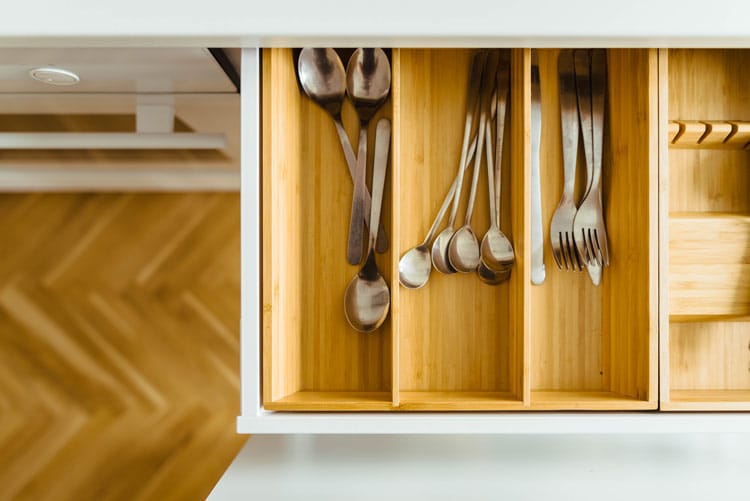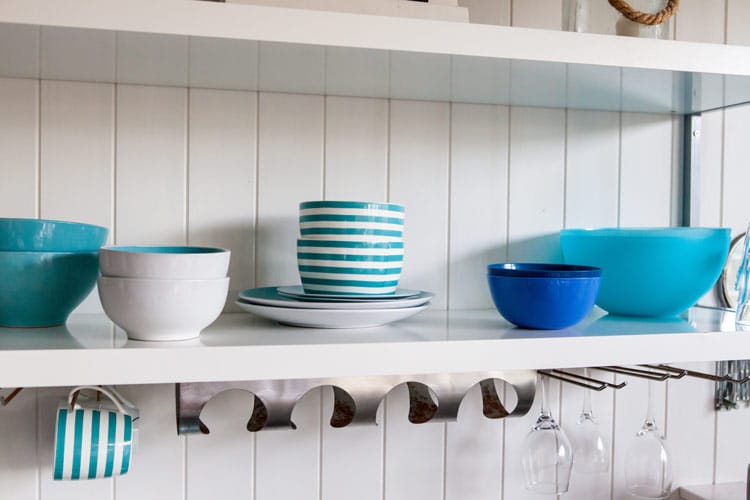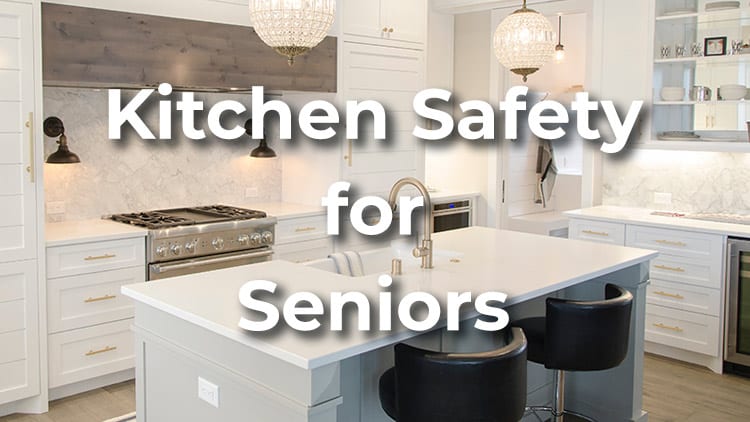Kitchens can be dangerous places, especially for kids and older people. Fortunately, you can do a lot to prevent burns, fires, and other accidents that sometimes can be really serious. Just by learning about kitchen safety and taking some simple precautions, you can prevent most injuries.
It’s not that difficult to make your kitchen a safer place for the elderly, and it’s well worth the effort.
After reading this guide you’ll be aware of the most common sources of kitchen accidents and you’ll also know exactly what steps to follow to avoid them. You’ll see that kitchen safety is all about common sense thus you can enhance it easily and quickly.
How can you improve kitchen safety for elderly people? In a nutshell:
First of all, make the kitchen well-lit and organized and use non-slip flooring to avoid falls and injuries. Keep the number of appliances to a minimum and place commonly used items within reach. Take all the necessary precautions to ensure safe cooking and prevent kitchen fires. Keep sharp knives separately and never store hazardous chemical products in the kitchen.
And now, let’s see in detail:
Use Non-Slip Flooring and Mats to Prevent Falls
Slips are not uncommon in the kitchen, however most of the time they’re preventable. The most important rule is to never leave spills on the floor. They should be cleaned up as soon as they get noticed. A wet, slippery floor can be a serious hazard for the elderly. Inspect the sink and look for water leak signs from time to time.
If you have rugs in the kitchen, make sure they’re non-slip ones. In case you’re planning to renovate the kitchen, choose non-slip porcelain tiles (here’s how you can make your existing tile floor less slippery). If you want a cheaper solution, use vinyl flooring or apply anti-slip coating. You can also encourage your loved ones to wear non-slip socks or non-slip slippers.
Make the Kitchen Well Lit and Organized to Avoid Injuries
Make sure there’s enough light everywhere in the kitchen at any time of the day.
A well-lit kitchen is especially important for seniors with vision impairments. If the kitchen has more entrances, make sure there’s a light switch at every door. You can also install automatic, motion-sensitive night lights to enhance safety.
Avoid smooth, shiny surfaces in the kitchen as they can often result in blinding glare that sometimes blocks vision and leads to falls. Older people, especially those with macular degeneration and cataracts are much more sensitive to glare.
Don’t leave drawers and cabinet doors open when you don’t use them. They may remain unnoticed by seniors which can lead to head injuries and falls. Identify and remove all other obstacles to provide easy navigation in the kitchen.
Keep the Sharp Knives In a Safe Place
Seniors may cut themselves accidentally with sharp knives while looking for other kitchen utensils if they’re all in the same drawer. To avoid these injuries keep the knives separately from other cutlery and always in the same place. Using a knife rack can be a good solution.

Don’t Use Unnecessary Kitchen Devices
Any kitchen device can be potentially hazardous for the elderly. That’s why it’s so important to keep the number of gadgets to a minimum in the kitchen and only use those that are really necessary.
It’s a good practice to unplug all appliances that are not in use. This way you can prevent them from switching on accidentally and also avoid falls caused by cluttered cords. By marking the buttons you can make it clear which ones are responsible for switching on and off the gadgets. Also, make sure electrical appliances are far enough away from the sink.
If your elderly loved ones need an electric kettle, purchase one that has an automatic shut-off feature.
Make Often Used Kitchen Items Easily Accessible

Bending and stretching are more dangerous for seniors as they tend to lose their balance easily. That’s why it’s so important to make sure that all often used kitchen tools are stored on easy-to-reach shelves. It’s also a good idea to have those items always in the same place so it’s easier for your loved ones to remember where they can find them.
For seniors, drawers are a better choice than doors, because they provide easier access to the utensils. When they pull out the drawer all of its content becomes visible without having to crouch or get on their knees. Make sure the drawers have big, easy-grip handles.
Keep heavier kitchen tools and appliances at or below waist level so it’s less likely that your loved ones lose their balance and fall while trying to get them off.
Place the microwave oven on the counter or just below counter height. It can be difficult for older people to lift plates above their shoulders.
Installing a pull-out pantry can have many benefits: it enhances safety by providing easy access to all of its content in a single motion. It also gives an organized overview of the available items and maximizes the storage place as well.
Safe Cooking and Kitchen Fire Prevention
Don’t let your elderly loved ones wear loose clothes during cooking because they can easily catch fire. Long, loose sleeves always should be rolled up to prevent them from touching the stove while it’s on.
To further enhance safety keep highly flammable objects like dish clothes, towels, and curtains far enough from the stove and open flame.
Both gas and electric stoves and ovens can be quite hazardous for elderly people as they can cause severe burns. Sometimes seniors forget about their last activity, in which case an automatic shut-off feature can be a lifesaver.
If the labels of the controls are difficult to read, it can often lead to confusion. Take the time and make those labels clearly visible and readable (you can use colored tapes) on the front of the stove.
During food preparation encourage wearing professional cut-resistant cooking gloves.
Kitchen accidents often occur because of forgetfulness. Suggest your loved ones use a kitchen timer whenever they start cooking. Make sure the timer is easy to handle and its alarm is loud enough. You can choose a model that is specially designed for seniors.
Be prepared and purchase a fire extinguisher. Place it somewhere easy to reach. Read the user’s guide and explain to your elderly loved ones how they can use it in case of emergency. Also, make them remember to never pour water on hot or burning oil. A fire extinguisher is always well worth the price.
Check out our comprehensive guide on cooking safety for even more useful tips.
Want to learn more about fire safety? We have a whole article with the best actionable fire safety tips for seniors.
Kitchen Safety for Seniors with Dementia
Seniors with advanced cognitive impairment often can’t recognize hazardous situations by themselves, have worse judgment, forget about their last activity, and sometimes they act irrationally.
That’s why it’s particularly important to make the kitchen safe for them (and other rooms of the house or flat as well). It requires careful and precise work but that’s the only way you can prevent them from accidents and injuries.
First of all, don’t let seniors with dementia use the stove, oven, electric appliances (especially those that don’t have an automatic shut-off feature), and sharp knives without supervision. They can cut or burn themselves and leave the stove or oven on which can lead to fire or a gas leak. You should always explain to your loved ones why you take those precautions. Make safety a priority.
Do not keep any chemical products in the kitchen. Depending on the severity of dementia consider locking toxic chemicals in a cabinet.
Older people with cognitive impairment often have some degree of swallowing and chewing difficulty. In this case, you should keep any food that might lead to choking out of reach.
More Tips for a Safe Kitchen
- Don’t store easily flammable liquids, and oils inside the kitchen.
- Sharp corners can cause severe injuries, so it’s best practice to round them all.
- When purchasing choose a shallow sink: a deep one makes dishwashing harder for seniors.
- Expired food is not uncommon in older people’s kitchens so it’s a good idea to check the fridge, pantry, and cabinets from time to time to avoid food poisoning (learn more about food safety for seniors)
- You can enhance kitchen safety by installing safety grab bars.
- Use unbreakable dishes that are made of steel, plastic, or other sturdy materials to prevent injuries from broken glass.
- Opt for kitchen and cooking tools that are designed for seniors.
- A trolley can be useful when moving food to another room.
- Don’t store hazardous chemical products in the kitchen, even if they’re in their original package. Many seniors suffer from vision impairments and they can easily miss the labels.
- Install a smoke detector in the kitchen.
- Check and clean kitchen ventilation systems regularly because dirty and faulty ones can often cause a fire due to the built-up grease.
- Keep the hot water temperature lower to prevent burns.
- To further enhance safety, it’s usually a good idea to install a medical alert button in the kitchen too.
We have a detailed list of 70+ home safety measures which you can find here.
Bathrooms are similarly dangerous places for seniors than kitchens. We’ve collected all the important things you should know about bathroom safety, so if you’re interested, make sure you don’t miss our thorough guide.










